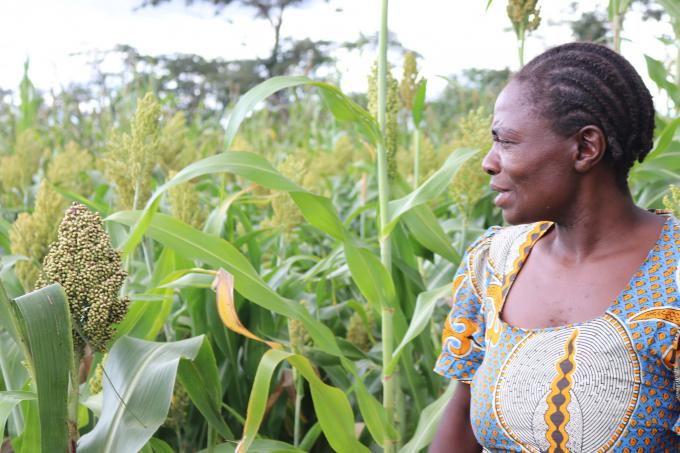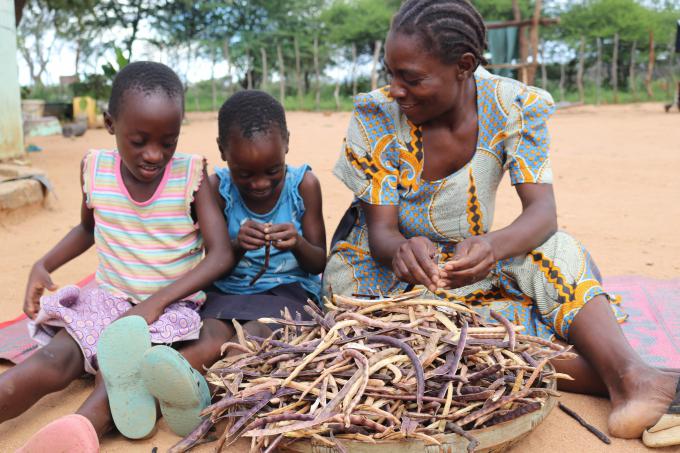Climate Resilient Farming Gives Communities Hope Amidst the Climate Crisis
After bending her back in the field for hours trying to grow food to feed her children and only to harvest little to nothing, Precious became hopeless.
“I have been harvesting barely anything for the past years due to little rainfall and very hot temperatures leaving all my crops wilted. I would worry about providing enough food for my children,”says Precious.

Precious lives with her husband and three children in a remote village in Matobo district. Her family depends on rain-fed agriculture to produce enough food to sustain themselves. However, the recent climate changes have made the area increasingly hot, making it difficult to yield enough grain. Desperate to provide for her family, Precious was delighted when she was selected to receive support under the EU-funded Stepping-up Post-Emergency Recovery and Resilience to Empower Vulnerable Communities in Zimbabwe (SUPER-EVC) project. The project implemented by Save the Children in partnership with ICRISAT aims to improve food security for families living in arid parts of Zimbabwe through various initiatives. These include equipping communities with knowledge on Climate Resilient Farming technologies which are suitable for their environment.
“I was selected to participate in the project in 2020. This made me so happy because I was told that the project was going to help us learn better ways of farming that will increase our yields as well as protect the environment.”
Precious took part in a series of field lessons and observations that equipped her with knowledge about the connection between climate, crops, soil management, pest and disease control as well as water conservation. All these lessons were conducted through the local Agricultural Extension Officer under the Ministry of Agriculture, ensuring that the farmers could continue to build their knowledge and understanding of sustainable farming practices.
“We were introduced to better ways of farming that help our yields as well as protect our environment from further damage. The Agricultural Extension Worker took us through practical trainings on water harvesting as well as moisture retention which entails digging trenches and pothole pits. This area is very dry and unpredictable. Every year, the rains come and go before our fields have thrived, leaving us struggling to survive. So, if we continue practicing these enviromental friendly farming methods rather than the convectional ways of farming we were used to, we stand a better chance of producing enough food for our families.” Precious explains.
As she learnt more, she began to apply the methods she was taught. She also participated in the Seed Fairs hosted under the project where she received seed vouchers to purchase small grains seeds packs such as groundnuts, cowpeas, sorghum and pearl millet.
“I used to grow maize but my crop would often wilt due to lack of rainfall. I have since shifted to growing groundnuts, cowpeas, sorghum, pearl millet and my field speaks for itself. My children will have enough to eat. We have already started eating some of the grain.”
Small Grains, A Game Changer
“It’s not only about their ability to withstand harsh climate conditions but the also nutritional value they offer.” Precious explained as she peeled some of the cowpeas she had harvested from her field.
Samukeliso 9, could not help but excitedly joined the conversation as she assisted her mother, Precious to peel the cowpeas.
“My mother prepares my siblings and I cowpeas soup for lunch and we enjoy it so much. I learnt about nutrients at school and my teacher told us that cowpeas have proteins that help us grow healthy and strong.”

Hope for the Future
Thanks to the project, Precious is confident that the harvest will last her family through the year. She also looks forward to selling some of the yield so that she can buy other essential items for her family. Precious’ story is a perfect example of how the SUPER-EVC project has drastically improved the lives of people living in the arid parts of Zimbabwe. “I am so happy to see my children enjoying the cowpeas. This is a good sign that Climate Resilient Farming is good for us,” she smiles.
Precious is now a source of hope in her village. She encourages others to embrace Climate Resilient Farming and hopes that more people in her community will join her and take advantage of the knowledge to improve their livelihoods.
The sky is still hot, and the sun is still unrelenting, but this time she is prepared for it, confident in her new farming methods. She now has knowledge and the fortitude to stand up against climate change.
“I want to thank the European Union for funding this project. It has given hope to many families in my village. We can now fight climate change,” she concludes.
Since inception, the SUPER-EVC project has improved the food security for 4500 households in Beitbridge and Matobo districts.
 Zimbabwe
Zimbabwe